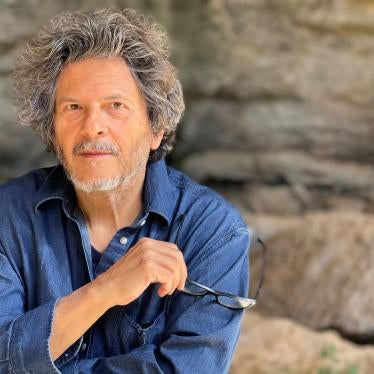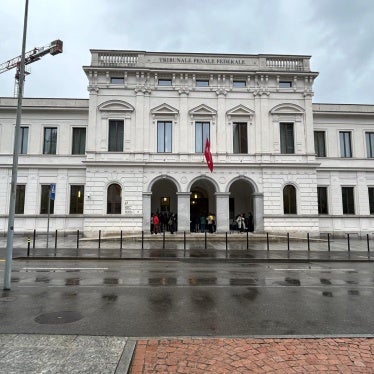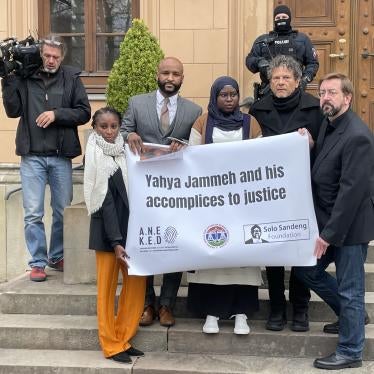Reed Brody, nicknamed the ‘Dictator Hunter’ has spent the past three decades pursuing dictators for atrocities and seeking justice for their victims. The American human rights lawyer and investigator was involved in the landmark cases against dictators Augusto Pinochet of Chile and Jean-Claude Duvalier of Haiti. Brody’s work with the victims of former Chadian dictator, Hissene Habre – who was convicted of crimes against humanity in Senegal, is perhaps his biggest achievement so far.
With Habre now behind bars, Brody is on his next big case: Bringing Gambia’s exiled former ruler, Yahya Jammeh to justice. In this exclusive interview with The Chronicle’s Sheriff Bojang Jr, Brody discusses why he is hunting Jammeh.
TC: Reed at the end of the Habre trial in Senegal in 2016, you retired from Human Rights Watch. But following the exit of the Gambia’s Yahya Jammeh a few months later, you came back to pursue him for alleged atrocities. Why did you decide to take up this case?
Brody: When I was working on the Habré case in Senegal, many people – including you Sheriff- would say that when I was finished I should go to Gambia and help Jammeh’s victims. After Jammeh fell, I was contacted by Nana-Jo Ndow, whose father Saul Ndow disappeared in 2013 and is presumed killed by the Jammeh regime, to ask for my assistance. I told her that bringing Jammeh to justice would depend more on what she and other victims were prepared to do than on anything I could do. Shortly thereafter, I was in Dakar for Habré’s final appeal with some of the champions of that case, the lawyer Jacqueline Moudeina, and the prison survivors Souleymane Guengueng and Clément Abaifouta. Gaye Sowe and the Institute for Human Rights and Development in Africa (IHRDA) arranged for us to come down to Banjul and share our experiences with a group of Jammeh’s victims and Gambian activists.
When you came to The Gambia in April 2017, did you feel anything specific that confirmed that gross rights violations were committed by the Jammeh regime?
Yes, we heard a lot of terrible things. But what I most felt was that there was a committed group of victims hungry to pursue justice. In only a few months, activists like Saul Mbenga had brought together survivors and families from across the spectrum. As Souleymane and the other Chadians described how they had overcome so many obstacles, I could see that the Gambians understood that it would take the same determination to bring Jammeh to justice. I remember Fatoumatta Sandeng (slain opposition activist Solo Sandeng’s daughter) saying how the Chadians had showed her that “victims’ voices can make the difference.” Baba Hydara (a son of assassinated newspaper editor, Deyda Hydara) said the Chadian experience showed that it was a “long, long, long battle. But we are ready.” I was so impressed with people like Ya Mamie Ceesay (whose son Alagie disappeared and presumed killed) and Ayesha Jammeh (whose father disappeared and presumed killed) whom I met at that meeting. That’s when we all decided to form an alliance that would become the “Jammeh2Justice” campaign.
Because everybody is interrelated in The Gambia, some people are worried it might be difficult – even impossible to successfully investigate the past atrocities. Is this a barrier to your quest for justice?
Yes and no. One the one hand, many victims do feel societal and familial pressure not to speak out. But on the other hand, working closely with the victims gives us access to so much word-of-mouth information, leads on evidence, and access to former officials across the different Gambian communities.
Hissene Habre ruled Chad with an iron fist and fled to Senegal following his ouster. Jammeh ruled The Gambia with an iron fist and went to Equatorial Guinea for exile. What else is identical between the two rulers when it comes to human rights issues?
They were very different rulers of different countries at different times. Habré, who was educated at the best schools in France, was more systematic, more calculating. Jammeh was more intuitive. No other ruler I know organized phony HIV treatment programs and witch hunts. But they both used fear as a governing tactic.
And it took 25 years before Habre’s victims got justice. Is it likely that Gambian victims will wait that long for justice?
I hope not. The Gambian victims are much better organized at this stage. Times are different too. In Chad in 1990, when Souleymane Guengueng came out of jail and started fighting for justice, everyone thought he was crazy. Today, you’re asking me, as everyone does, “how long will it take?” That said, we never expected that the Habré case would take so long. We got Habré indicted for the first time in Senegal in 2000, but it took another 15 years of campaigning across the globe, and the defeat of Abdoulaye Wade, before Senegal put him on trial. Regarding Jammeh, there are several variables. First, of course, he is in Equatorial Guinea. Second, Gambia itself is not ready to have Jammeh come back yet. The political, security and institutional conditions don’t yet exist for this to be a responsible course of action. Third, we have to build the factual and legal case, but frankly that is the least difficult.
In the Habre investigation, you stumbled on piles and piles of files in Chad at the headquarters of the intelligence service linking that regime to some of the most gruesome atrocities. In The Gambia, all eyes have been on the headquarters of the National Intelligence Agency or NIA (now State Intelligence Services or SIS) for similar evidence. Have you had any access to that place so far?
That’s right. The thousands of files we found in Chad were a road-map to how Habré carried out the repression. Daily lists of prisoners and deaths in detention, interrogation reports and documents sent directly to Habré on the fate of individual prisoners. At trial, for instance, we showed a document with Habré’s handwriting denying prisoners access to a hospital. Documents are the king and queen of evidence. All regimes keep records, if only for bureaucratic reasons. At the very least, there are lists of detainees. I haven’t seen anything like that here in Gambia. From day One, I have been preaching “secure the evidence.”
There have been reports that physical evidence of past atrocities, including files at the NIA premises have been tampered. Wouldn’t this complicate your investigation?
The NIA premises were reportedly cleaned and painted. Gambia Bar Association President Rachel Mendy recently stated that evidence was being destroyed. The former NIA legal advisor said the same thing. If it is true, this will make it much more difficult to identify abusive officials and to build legal cases not just against Jammeh but any state actors.
So in the absence of such physical evidence, what else might be there to build your case around?
The challenge is to prove the link between the top man, Jammeh, and the person who carried out the crime. For that, you need to understand how the system worked, and you need the testimony of those on the “inside.”
You also working on the killing of Ghanaian migrants and their friends in The Gambia. How strong is that case so far to bring Jammeh and his officials to justice?
We interviewed dozens of former officials, including 11 officers directly involved in the incident. They revealed that the migrants were murdered after having been detained by Jammeh’s closest deputies in the army, navy, and police forces. The witnesses identified the Jungulars (Jammeh’s death squad) as the killers. We presented that evidence to Ghana’s president Akufo-Addo. Ghana is now examining whether to move forward with an investigation. The Gambian authorities have vowed to cooperate with that investigation.
The Truth Reconciliation and Reparations Commission (TRRC) is underway. What’s your impression so far?
Admiration for the transparency and care with which it was set up and launched. The TRRC is methodically building the case. It’s giving a voice to the survivors and creating not just a record but a demand for justice that I think will help the victims demand full accountability. People are watching and we all are learning the depths of what was perpetrated. It’s hard to listen to testimonies like that of Batch Samba Jallow who was cruelly tortured and not want to see justice done.
Yahya Jammeh is all the way in Equatorial Guinea. Do you see him getting extradited anywhere?
I wouldn’t be doing this if I didn’t! Obviously, Jammeh chose to go to Equatorial Guinea because he felt it was safe. Jammeh and Obiang partied together on New Year’s Eve. We showed in the Habré case, however, that tenacious victims can create the political conditions even for African states to prosecute a former African leader. As the TRRC proceeds, people will appreciate the full extent of the regime’s crimes. We hope to create a regional consensus that will convince Obiang that it isn’t in his interest to protect Jammeh. In the migrants’ case, the Jungulars killed Ghanaians, Nigerians, Ivoirians, Togolese and Senegalese. Jammeh used Casamance as his personal cemetery. So a lot of states have reasons to pursue this.









